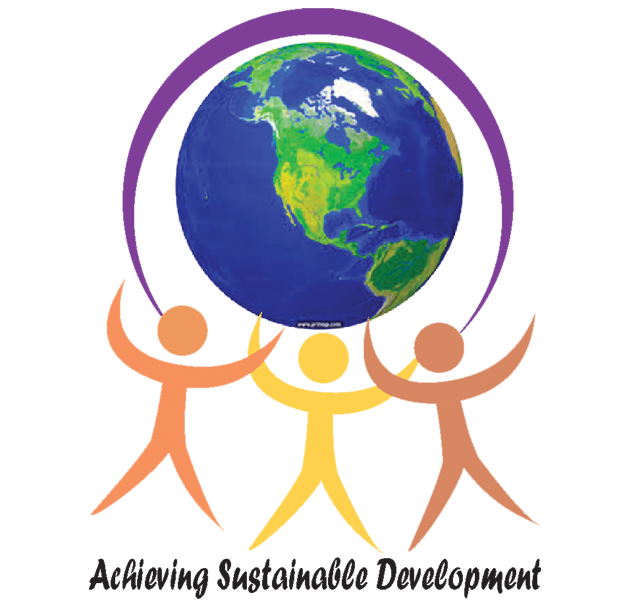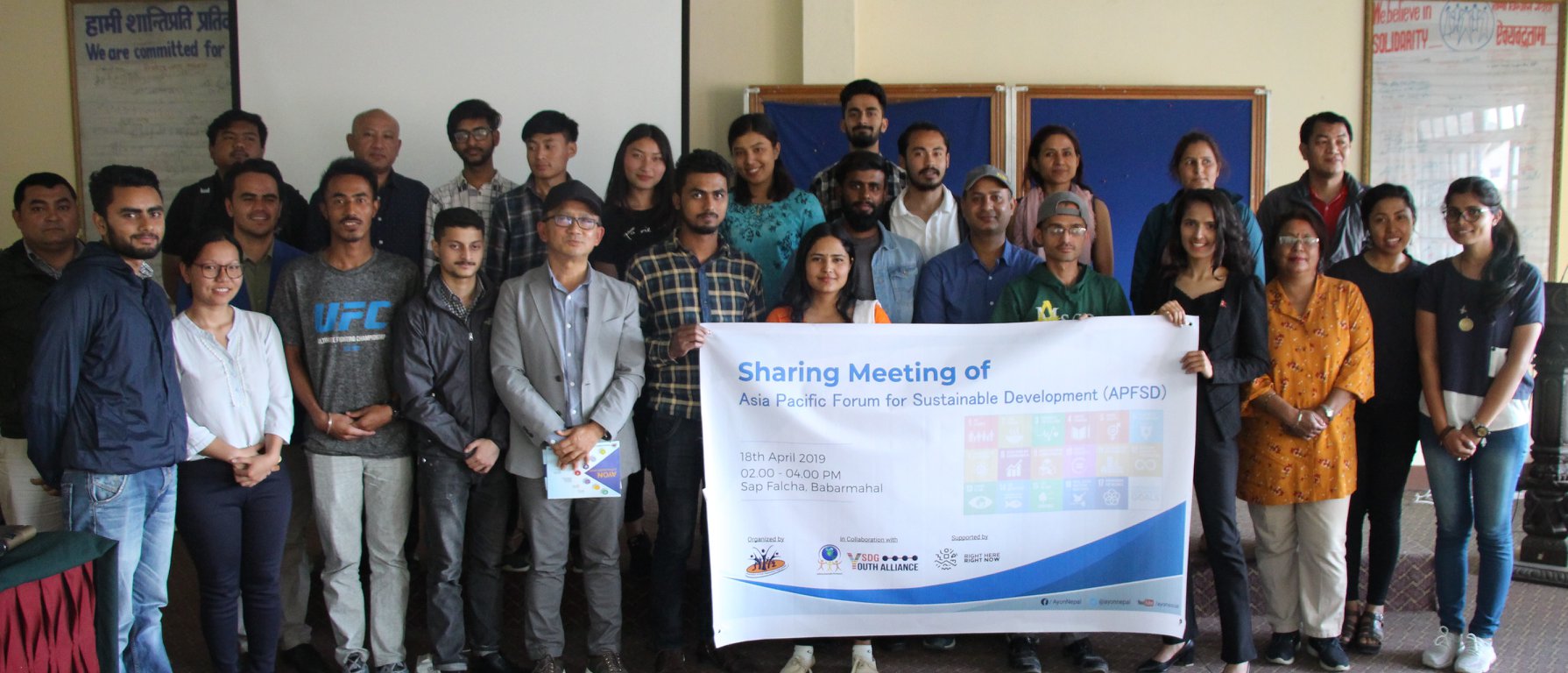Background
As the successor of MDGs, 2030 agenda of sustainable development was adopted by all member states of UN in September 2015, which is universal, integrated and transformative agenda for sustainable development. It has tried to remedy the shortcomings and gaps of the MDGs. Agenda 2030 is integrated, indivisible and balance of three dimensions of sustainable development: economic, social and environmental and poverty eradication is stated as the overarching goal. UN 2030 agenda has proposed 17 goals and 169 targets and they are integrated and indivisible, global in nature and universally applicable. In order to mainstream the 2030 Agenda, Government of Nepal has formed high level mechanisms and came up with SDGs Status and Roadmap 2016-2030 document by identifying 479 monitoring indicators.
The High-level Political Forum (HLPF) is the United Nations’ central platform for follow-up and review of the 2030 Agenda for Sustainable Development and the Sustainable Development Goals (SDGs) that provides for the full and effective participation of all States Members of the United Nations and States members of specialized agencies. The meeting of the HLPF on Sustainable Development of 2020, under the auspices of the Economic and Social Council (ECOSOC), will be held from 07-16 July 2020; including the three-day ministerial meeting of the forum from 14-16 July 2020 in UN Headquarter, New York. The theme will be ‘Accelerated action and transformative pathways: realizing the decade of action and delivery for sustainable development’.
As part of its follow-up and review mechanisms, the 2030 Agenda for Sustainable Development encourages member states to “conduct regular and inclusive reviews of progress at the national and sub-national levels, which are country-led and country-driven” (paragraph 79). This process is called National Voluntary Review (VNR). These national reviews are expected to serve as a basis for the regular reviews by the HLPF, meeting under the auspices of ECOSOC. As stipulated in paragraph 84 of the 2030 Agenda, regular reviews by the HLPF are to be voluntary, state-led, undertaken by both developed and developing countries, and shall provide a platform for partnerships, including through the participation of major groups and other relevant stakeholders. In 2020, 50 countries (27 first time presenters, and 23 second time presenters) will present their national voluntary reviews to the HLPF. Government of Nepal has also registered its name to participate in the VNR process for this year, although Nepal commenced VNR first time in 2017.
The consultation meeting of civil society Major Groups and stakeholders, held on 25 November 2019 in Kathmandu, decided to conduct the Voluntary Peoples Review of SDGs in Nepal (VPR 2020), 2nd Nepal Youth Forum and 2nd Nepal Peoples Forum on Sustainable Development 2020, which are purely led by people based organizations and civil society Major Groups and Stakeholders identified by Peoples Forum last year. Based on the background information, this concept paper has been prepared. The theme of the VPR 2020 is Amplifying Voices of the People: Closing the Gaps of SDGs.
Objective
The main objective of the Volunteer Peoples Review 2020 is to review the progresses and achievements made by the country on UN 2030 Agenda through peoples’ perspectives, including critical review of its implementation process and institutional arrangements and a report will be produced. The review process will assess the progress status of each goal, but gender equality will remain as cross-cutting agenda of all goals. Moreover, VPR 2020 aims to facilitate the sharing of experiences, including successes, challenges and lessons learned, with a view to accelerating the implementation of the 2030 Agenda.
Participation
VPR 2020 is obviously civil society led process. So, there will be directly involvement of civil society Major Groups and Stakeholders including (identifying according to UN and Constitution of Nepal) including (i) NGOs, (ii) Youth, (iii) Women and Girls, (iv) Children, (v) LGBTIQ, (vi) Migrant Workers, (vii) Scientific and Technological Community, (viii) Cooperatives, (ix) Workers and Trade Unions, (v) Indigenous Peoples, (xi) Dalits, (xii) Madhesi, (xiii) Farmers, (xiv) Senior Citizens, (xv) Muslims, (xvi) People Living with Disabilities (PWDs), (xvii) People Living with HIV and AIDS (PLWHA), (xviii) Local Authorities, (xix) People Affected by Conflict, (xx) academic society, (xxi) Micro-entrepreneurs, (xxii) micro-finance groups, (xxiii) CBOs, (xxiv) single women, (xxv) Landless and squatters, and (xxvi) People affected by natural disasters. There will be inclusive participation and promoting the spirit of Leaving No One Behind including the peoples new to engaging in the UN processes and those already engaging in UN processes, bodies and mechanisms. There will be active participation of INGOs working in Nepal. Review process will involve parliament members/parliament committees, think tanks, constitutional bodies as well. But, the interactions and consultations will take place with concerned Government agencies at national, province and local level.
Date and venue
It is estimated that the whole process of preparing report with take seven months. It will start from 1 January to 31 July of 2020.
Major activities
VPR process will be fully driven by civil society Major Groups and Stakeholders, so it will be inclusive, participatory and open. Following activities will be undertaken for VPR 2020 process:
| Preparatory meeting among civil society Major Groups and Stakeholders | 31 January | National Coordination Committee |
| Consultation in seven provinces, Province Level Peoples Forum | February | CSOs |
| Collect data, analysis and prepare a draft thematic/goal-wise review report | March | Theme focal organizations |
| Discussion by civil society Major Groups/Stakeholders at national level and improve thematic/goal-wise review report | April | Major group focal organizations |
| Meetings/consultation with key government agencies, private sector, media, UN country team, INGOs, MDBs, academic institutions, local governments and their associations, development experts | April | Theme focal organizations |
| Preparation of draft VPR report by compiling thematic/goal-wise report | April | National Coordination Committee |
| 2nd Youth Forum on Sustainable Development 2020 | 4 May | National Coordination Committee |
| 2nd Nepal Peoples Forum on Sustainable Development 2020 | 6 May | National Coordination Committee |
| Advocacy activities (Delegation, media, writ articles in newspaper etc.) | May | National Coordination Committee |
| Publish VPR Report | June | National Coordination Committee |
Expected outcomes
The Report of “Voluntary Peoples Review on SDGs in Nepal” will be a main outcome this process that would analyze the country progress status on SDGs including implementation process, mechanisms, experiences and lessons. Recommendations will be an important part for further actions. This report will be helpful to the government, CSOs, UN Agencies, Bi-lateral Agencies, INGOs and other stakeholders for policy improvement and expedite their roles in achieving the SDGs in the country. The report gives priority to present qualitative information regarding progresses and achievements.
Resources required and funding
Some financial resources will be required for the VPR process, collection of information/data, cost of consultations/meetings/sharing events etc., remunerations of technical service providers (consultants), publication of report, and management cost. Two experts having in-depth knowledge on SDGs will serve as consultants. The total estimated cost of the work is 2,650,000/- Nepali Rupees. International organizations (inside or outside Nepal) working in the sector of SDGs are expected for co-funding. Sources of funds will be following:
- Individuals
- Civil Society Organizations and their networks
- INGOs
- UN Agencies
So, International organizations will remain as functional partners and their expertise will add value in the whole VPR process and in producing the quality report. Financial status including income, expenditure, balance and contributors will be published in the report. Identity of participating organizations will be visualized in banners and VPR Report 2020.
Management Arrangement
On behalf of SDGs National Network Nepal, its National Coordination Committee will be solely responsible to organize the entire process and preparation of the report. But, an inclusive working group will be formed at national level including civil society Major Groups, Thematic Groups and Cross-cutting Thematic groups including INGOs. All the activities of the process will be carried out under the banner of SDGs National Network Nepal. Following organizations are playing coordination role at national level.
- Association of Youth Organizations Nepal (AYON)
- Dalit Welfare Organization (DWO)
- Dalit Youth Alliance (DYA)
- National Campaign for Sustainable Development Nepal (NACASUD-Nepal)
- National Farmers’ Group Federation (NFGF)
- Nepal Disabled Women Association (NDWA)
- Women for Human Rights Single Women Group (WHR)
- Youth For Environment Education Development (YFEED)

